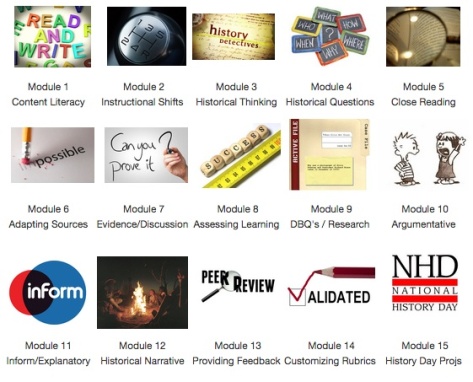 On Monday, June 22 the National Council for the Social Studies began its first MOOC with a free 15 module online course on Improving Historical Reading and Writing. After emerging as an educational phenomenon in 2008, a growing body of research has examined Massive Online Open Courses (MOOCs). Recent data from 68 open online courses showed overall participation in MOOCs has remained substantial and growth rates are steady. Further, teachers made up thirty-nine percent (39%) of these MOOC students, which bolsters an argument put forth by Seaton that residential college courses are less likely than MOOCs to attract teachers of the topic, as the cost, time commitments, and geographical constraints are likely to be burdens. In contrast, MOOCs offer nonbinding exploration and content that may be repurposed for a teacher’s classroom.
On Monday, June 22 the National Council for the Social Studies began its first MOOC with a free 15 module online course on Improving Historical Reading and Writing. After emerging as an educational phenomenon in 2008, a growing body of research has examined Massive Online Open Courses (MOOCs). Recent data from 68 open online courses showed overall participation in MOOCs has remained substantial and growth rates are steady. Further, teachers made up thirty-nine percent (39%) of these MOOC students, which bolsters an argument put forth by Seaton that residential college courses are less likely than MOOCs to attract teachers of the topic, as the cost, time commitments, and geographical constraints are likely to be burdens. In contrast, MOOCs offer nonbinding exploration and content that may be repurposed for a teacher’s classroom.
In a TED Talk that has been viewed more than 800,000 times, Agarwal (2013) argued that massively open online courses have the potential to reimagine education with: (a) active learning; (b) self-pacing; (c) instant feedback; (d) gamification; and (e) peer learning. The NCSS MOOC helps to leverage its members’ expertise and direct these elements in improving teacher professional development in History-Social Studies. In creating MOOCs for professional development assets, the NCSS can fulfill a need that is not being met by schools or districts and help teachers stay current with their content knowledge and pedagogical trends.

So far in the first 24 hours of the course, there have been over 8,600 page views, 400 participations and 144 discussions started. Teachers are connecting with each other and proceeding through the course at their own pace. It will be interesting to see how those numbers increase by the end of the summer.
References
Agarwal, A. (2013, June). Why massive open online courses still matter. Technology Education & Design. Monterrey, CA. Accessed at http://www.ted.com/talks/anant_agarwal_why_massively_open_online_courses_still_matter/transcript?language=en
Ho, A. D., Chuang, I., Reich, J., Coleman, C., Whitehill, J., Northcutt, C., Williams, J. J., Hansen, J., Lopez, G., & Petersen, R. (2015). HarvardX and MITx: Two years of open online courses (HarvardX Working Paper No. 10). Accessed on April 2, 2015. doi:10.2139/ssrn.2586847

Hi Dr. Petri, I participated in the Summer 2015 Improving Historical Reading and Writing MOOC on Canvas and I was wondering if there is a place where we can go back and access the resources we were provided to read through the course? I am currently working on my Masters in Curriculum and Instruction, and I often want to go back and find information we discussed and read during the class to support my background knowledge. I am particularly interested in content literacy module and the effects high stakes testing has had on the decrease in social studies courses in elementary education, despite the importance of social studies to building context in.
LikeLike
You should be able to log into Canvas.net and find the class under archived courses. The resources should still be there in the course shell. Good luck with your Masters. There is lot’s of research about the marginalization of Social Studies. Start here: https://ccsso.org/resource-library/marginalization-social-studies
LikeLike